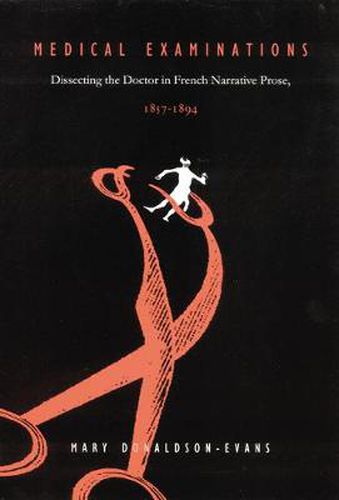Readings Newsletter
Become a Readings Member to make your shopping experience even easier.
Sign in or sign up for free!
You’re not far away from qualifying for FREE standard shipping within Australia
You’ve qualified for FREE standard shipping within Australia
The cart is loading…






From the crude battlefield surgery of Revolutionary times to the birth of modern clinical medicine, the 19th century witnessed impressive developments in the medical sciences and a concomitant growth in the prestige of the medical practitioner. In France this phenomenon had important implications for literature as writers scrambled to give legitimacy to their enterprise by allying themselves with science. Overflowing its traditional banks, medical discourse inundated the field of French literature, particularly in the realist and naturalist movements. The literati’s enthralment with medicine and their subservient adoption of a medical model in the creation of their plots and characters have not previously been seriously questioned. In this work, Mary Donaldson-Evans corrects this oversight. Exploring six novels and two short stories published during the Second Empire and the early Third Republic, she argues that there was a growing resistance to medicine’s linguistic and professional hegemony, a resistance fraught with ideological implications. Tainted by a subtle-and sometimes not so subtle-anti-Semitism, some of the fiction of this period adopts counter-discursive strategies to tar the physician with his own brush. Featured authors include Gustave Flaubert, Edmond and Jules Goncourt, Emile Zola, Joris-Karl Huysmans, Guy de Maupassant, and Alphonse and L on Daudet.
$9.00 standard shipping within Australia
FREE standard shipping within Australia for orders over $100.00
Express & International shipping calculated at checkout
From the crude battlefield surgery of Revolutionary times to the birth of modern clinical medicine, the 19th century witnessed impressive developments in the medical sciences and a concomitant growth in the prestige of the medical practitioner. In France this phenomenon had important implications for literature as writers scrambled to give legitimacy to their enterprise by allying themselves with science. Overflowing its traditional banks, medical discourse inundated the field of French literature, particularly in the realist and naturalist movements. The literati’s enthralment with medicine and their subservient adoption of a medical model in the creation of their plots and characters have not previously been seriously questioned. In this work, Mary Donaldson-Evans corrects this oversight. Exploring six novels and two short stories published during the Second Empire and the early Third Republic, she argues that there was a growing resistance to medicine’s linguistic and professional hegemony, a resistance fraught with ideological implications. Tainted by a subtle-and sometimes not so subtle-anti-Semitism, some of the fiction of this period adopts counter-discursive strategies to tar the physician with his own brush. Featured authors include Gustave Flaubert, Edmond and Jules Goncourt, Emile Zola, Joris-Karl Huysmans, Guy de Maupassant, and Alphonse and L on Daudet.